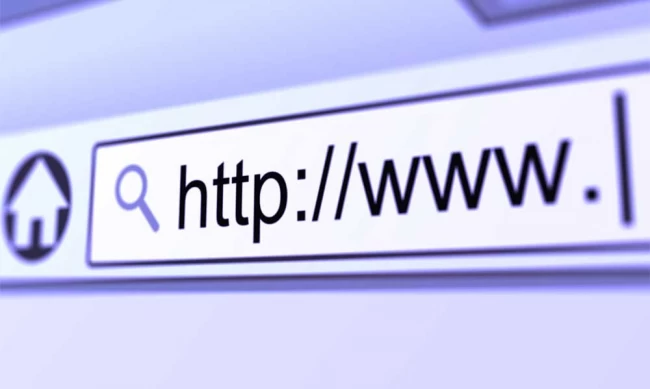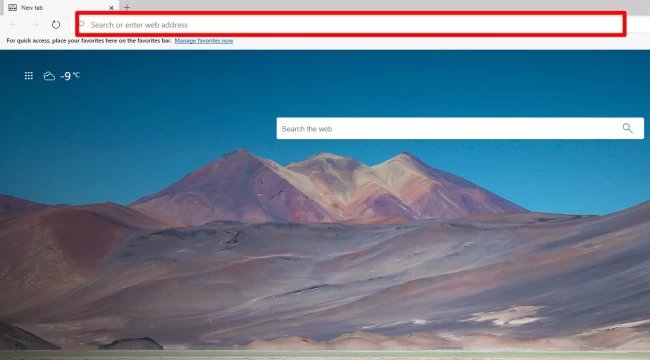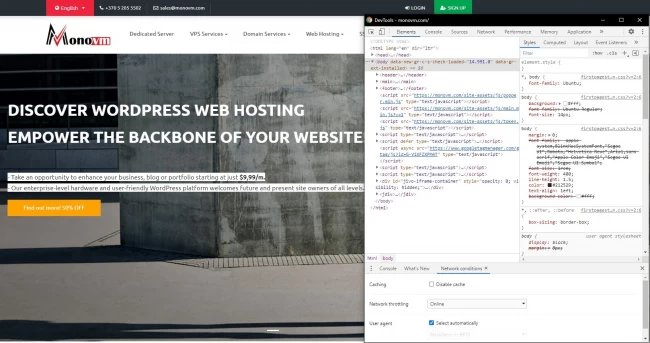List of content you will read in this article:
In today's digital age, websites are an integral part of our lives. They are ubiquitous and have become an essential tool for businesses, organizations, and individuals. But what is a website? In this article, we'll explore the meaning and significance of websites.
What is a Website?
A website is a related collection of web pages that are publicly accessible and share a single domain name. These publicly accessible websites collectively constitute the World Wide Web (www). A website is less frequently also termed as ‘web presence’ or ‘site.’ Tim Berners-Lee, a British physicist, built the first website at CERN that was launched on August 6, 1991. There are billions of websites created by billions of different people.
Purpose of Websites
Yes, that's correct. The purpose of websites can generally be categorized into these four main categories:
-
Providing information: Websites can be used to provide information about a variety of topics, such as news, education, healthcare, entertainment, and more. They can serve as a platform for sharing knowledge and insights with others.
-
Promoting products or services: Websites are often used by businesses to promote and sell their products or services. They can be used to showcase products, offer discounts, and provide customer support.
-
Facilitating communication: Websites can also be used to facilitate communication between individuals or groups. For example, social networking sites allow people to connect with others who share similar interests, while forums and chat rooms allow people to discuss specific topics.
-
E-commerce transactions: Websites can be used to buy and sell goods and services online. E-commerce sites can include online marketplaces, online stores, and auction sites.
Importance of websites in today's digital age
Websites are of great importance in today's digital age for several reasons:
-
Increased accessibility: With the internet being widely accessible around the world, websites allow businesses and individuals to connect with a global audience 24/7.
-
Improved communication: Websites allow individuals and businesses to communicate with their audience easily and efficiently. This can be through blog posts, contact forms, live chat, or social media integration.
-
Marketing and promotion: Websites are a cost-effective way to market and promote products or services to a broader audience. They can be used to build brand awareness, drive traffic, and generate leads.
-
Sales and revenue: Websites can be used to sell products and services directly to customers, which can increase revenue and profits for businesses.
-
Credibility and trust: Having a professional-looking website can establish credibility and trust with potential customers or clients. It can also provide a platform for showcasing testimonials, awards, and industry recognition.
-
Data collection and analysis: Websites can be used to collect data on visitors, such as demographic information, browsing behavior, and interests. This information can be used to improve marketing strategies and customer experiences.
Who can create websites on the Internet?

Websites can be created by an individual or a group of individuals for personal, business, or other purposes. Initially, websites were classified by their top-level domains. For example, educational institutions sites- .edu, government agency sites- .gov, non-profit organizations’ websites- .org, information sites- .info, and so on and so forth. Though these extensions still exist, the “com” extension has become more popular, and many other country-specific extensions like .co.uk, .de, .fr, etc.
How can you open a website?

You can visit a website's homepage by entering its URL address on a browser such as Chrome, Internet Explorer, Safari, or Firefox. The URL address for a site is usually “https: //www. (Name of the website).com,” which will open the homepage. If you don’t know the URL of the website, you can use a search engine such as Bing or Google.
The ‘homepage’ is the website's main page; this is the first page you usually see when visiting a website. From here, you can access all other pages of the website. Each page is a single HTML document that is connected through hyperlinks, combined in a navigation bar that allows the user to move across the main website’s structure.
Another critical and recurring section of most websites is the footer, found at the bottom of every page. The footer comprises external links indicating analogous websites and other external resources, along with important information, privacy policy, disclaimers, links to the terms of service, contact pages, and the physical address of the company that owns the site.
How do websites work?

Surfing the internet is second nature to most of us. Almost every day, we browse through innumerable websites, but have you ever wondered how a website works? To explain to a layman, the human eyes, ears, legs, and arms can be considered analogous to a website’s text, images, videos, and buttons.
Moreover, humans and websites are both governed by a code. It’s our DNA for humans, and for websites, it’s HTML, hypertext markup language. This is a language that web browsers interpret and convert in order to display information that we can comprehend.
Furthermore, websites are hosted on servers, which can be accessed by a device that has an internet connection and a web browser. Now, you can either have your own server, or you might need to rent a space from a web hosting provider to host your website on their server for a monthly fee.
CSS Style
Most websites employ CSS (cascading style sheets) to ensure uniform and an all-inclusive style throughout the website. CSS is an in-built shortcut that allows developers to automatically update the whole website when a change is made to one page. For example, if you want to change the colors on a company’s website, all you need to do with CSS is to change the color palette on one page, and the color on the rest of the pages will also automatically change.
Using CSS, developers can also make multiple versions of a different website. This can help make extra style sheets for mobile, other operating systems, and so on. Simply put, CSS is a programming tool developers use to make simple and overall changes to a website.
Types of Websites

There are several different kinds of websites, depending on the audience they cater to. A website may also be a Forum where people’s queries are answered- Quora, Webmail website- Gmail, Search engine website- Google, Social networking website – Facebook, Twitter, Media sharing website – YouTube, SoundCloud, Flickr. There are many other websites too, but the above mentioned are examples of popular websites.
Nowadays, there are many business, information, educational, government, and entertainment websites that have changed the way people use the internet. However, there are even certain websites that have malicious content that can cause your personal data to be hacked. Some websites spread fake news, and yet others have unsolicited content not suitable for children.
Let us take a look at some of the broad categories that most websites would fall into:
- Practical Information/ Informative: Such websites are very helpful regarding all sorts of information. These are ideal for understanding a topic better and also for guidance, instructions, and support information. Tips and tricks, “how-to’s,” medical news, fix and repair, directions, etc., are some topics that you may find. Educational and government, and news websites also fall into this category.
- Blogs: The purpose of blogs is to keep a website updated with current and trending ideas, typically run by an individual or a group. Blogs can be information-centric written in an informal or conversational style, or they may be personal recounts, professional blogs that may give an insight into a person’s experience, or those written for light-hearted entertainment. Blogs are usually easy to understand and gets people engrossed in a variety of topics. Blogs can be started online using free services such as Wordpress.com.
- E-commerce: These websites promote business activities like buying and selling products or services. Amazon is an example of an e-commerce website. An affiliate or an auction website (E.g., eBay) or a classified ads website (e.g., Craigslist) can all be classified under the e-Commerce website. With fierce competition, an e-Commerce website requires a lot of research, solid online marketing efforts, and a well-thought-out-strategy to make a notable online presence. A flourishing e-Commerce website should have a smooth purchasing and checkout process, attractive and mobile-friendly features that guide buyers to related products and offer incentives, proper payment methods, and nurture past buyers to come back for more.
- Service-Based: The services offered by a company that is reliable, professional, and reputable can attract potential customers when they visit such a website. Depending on the visitor's needs, they can view the company’s profile, the services it offers, customer reviews, affordability, and the quality of services provided. Such information can be displayed in the form of videos, infographics, articles, and blogs to convince visitors to try their service.
- Entertainment: As the name suggests, these websites may compromise gaming websites, celebrity news, online magazines, sports coverage, movies and their reviews, arts, humorous content, etc. To keep the viewers engaged, videos, slideshows, and podcasts can be uploaded regularly.
- Social Media: Communication, whether business or personal, has become fast and easy due to social networking websites. Within seconds, personal information, interests, preferences, photos, and videos can be shared with friends, family, acquaintances, or business personnel. And feedback is also instantaneous.
Benefits of a Website

In recent times, having is a website is crucial, especially if you run an online business or want to earn money online. You never know how many people you may attract by your online presence 24/7.
Owning a website means your customers can find you online anytime, anywhere, which can help you find and secure new customers conveniently. Even if your business is offline, having a website will lead customers to you. In today’s digital world, anything or service you need can be easily looked up using a search engine. If you have a website, it will show up in the relevant search and help customers connect to you.
Having a website also builds credibility for your business. In today’s modern world, it is expected from every credible brand to have an online presence. People tend to trust businesses less that do not have an email or website. The website can act as a means to communicate basic information about your services to your potential customers, answering many of the questions they may have in mind. A well-made, user-friendly website encourages users to opt for a product or service as they expect a similar experience when interacting with the company.
A website could even act like your whole and sole interaction with customers, as in the case of online stores. This could potentially save you a lot as it eliminates the need for a brick-and-mortar store completely. Without the overhead of operational and maintenance costs, you could make a huge profit!
Since your store is online, it is not limited to any geographical boundaries, and you could essentially sell your products worldwide. Anybody from anywhere around the world can access your website and is, therefore, a potential customer. All thanks to having a website!
Gone are the days when you had to hand out brochures or get posters printed to market your new store and attract customers. In today’s digital world, everything is available online; on websites. Having your own website can help reach out to potential customers. Social media websites like Facebook play an important part in this, connecting you to millions of people from the comfort of your home.
Conclusion
In the end, a website is a place on the Internet where people can go to find information, products, or services.It's an important tool for businesses, groups, and individuals, and making one requires skills in web development.Websites are hosted on web servers and can be accessed from various devices. With the ever-increasing importance of the internet, websites will continue to play a vital role in our lives.
![What is a Website? [Definition] Essential Elements and Types Explained](/wp-content/uploads/2021/01/cover302-main.webp)